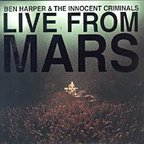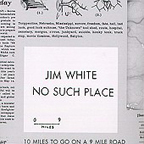|
Remember old dude from the White Citizens Council, said rock'n'roll "lowered the white man to the level of the nigra?" If he'd heard this record and realized how right he was, he'd've nailed himself to his own burning cross. Especially since it was the white woman him and his'n were sweatin' over, and Peaches is his nightmare of miscegenation come true: a milk-pale Canadian chick doing a me-so-horny mix of hip-hop, punk and electronica for a German label. With a voice somewhere between Li'l Kim and PJ Harvey, Peaches discusses the ramifications of sexuality as an instrument of female power in millennial culture. In other words, she talks dirty. Very dirty. So dirty, only three songs out of eleven are fit for airplay, and one of those is an instrumental. Peaches' gimmick, a vanilla vamp coppin' cocoa flava, is what brings in the marks. And it is hot (and funny) as hell. But I dig her sound. When she appeared at Mecca, with her short black curls, black plastic jacket and insectile shades she looked exactly like the love child of Alan Vega and Martin Rev, who as Suicide were founding fathers of electronica. With its stark simplicity so unlike current hip-hop, the music behind the minx reminds this dirty old man of Suicidal punktronic combos like Smersh and Fad Gadget. Full of industrial hiss and chug, the best song, "Diddle My Skittle", exemplifies how Peaches hijacks garage geek apocalypso in the name of backseat sensuality. If I met a stripper who danced to this, I'd give her every dollar I had.
 Ben Harper and the Innocent Criminals Ben Harper and the Innocent CriminalsLive From Mars Virgin Records In today's pop-saturated music world, Ben Harper is a throwback to an age when music was an experience, not a Swedish-manufactured confection gobbled up by pimply hordes of prepubescent imps. Three musically refreshing, beautifully crafted and emotionally engaging studio albums have proved the instrumental and lyrical strong-arm of this folk/reggae/rock star. Yet the somewhat restrained studio tracks deprive listeners of the barrage of sounds ebbing and flowing from the microphone and guitar amps of this concert impresario. Ben Harper's two-disc Live From Mars release aims to encapsulate the musician's unique vocal and instrumental style; to harness Harper's undulating voice and ethereal guitar work for those unable to attend his concerts. Harper covers a great breadth of his own working, drawing equally from his three studio albums (Welcome to the Cruel World, Fight For Your Mind, and Burn To Shine) while also incorporating select covers, including Marvin Gaye's "Sexual Healing" and Richard Ashcroft's "The Drugs Don't Work." In these covers, Harper's skill is aptly showcased: not only can he floor an audience with his own work, but he is able to take another artist's work to previously unexplored levels. Harper's version of Marvin Gaye's erotic classic is the best yet, perhaps better than that of the late soul singer himself. Much of the recording's charm owes to Harper's well-balanced set selections, sampling his mainstream hits (such as "Burn One Down" and "Steal My Kisses") with less heard tracks like "Roses From My Friends," "Power of the Gospel" and "Walk Away." True to form, Harper's sonically and emotionally well-endowed Live From Mars proves to be a gem for both hardcore fans and Harper beginners alike. -Eric Newman
Sometimes talents can get suckered into genre-mixing. Usually, that amounts to the singing or songwriting from a tried-and-true musical style, contending with production and arranging gloss/dross brought in from something more trendy. This can produce some of the most disappointing tracks ever to grace a cutout bin. Think Sinatra's first stabs at covering the Beatles. Or the respective shots at a disco single from The Kinks, Kiss, and Wings. The dolloping on of electronica and DJ moves have become almost pandemic now - frequently from artists who don't need the "help." U2's Pop comes sadly to mind. But look what Brit trip-hop trio Morcheeba can do to dress up a self-aware alt-country act. The three cuts they work on give a boost to Jim White's already-worth-repeated-listening musical stories. The rest of the set doesn't have the oomph that turns "Tied to a Fence in Mississippi" and "The Wound That Never Heals" into the best one-two leadoff of any album this year. Lesser lights offer lesser production, putting too many or too few treatments on White's voice. It's a refreshing enough instrument as is - unlike all the other storytellin' troubadours who seem happy with second-place in a John Prine singalike contest, White often sounds more like some coked-up character being played by Harry Dean Stanton. The gleefully offensive redneck-trash anthem "God Was Drunk When He Made Me" comes off well, as does the requisite attempt at redemption through poignant observation "Christmas Day." White's got a great way of self-regulating when he seems to be heading over the top; there might actually be a touch of Elton John's more wicked side among Jim White's writing and performing sensibilities. -T.E. Lyons
|
||
|
|
 Peaches
Peaches  Jim White
Jim White